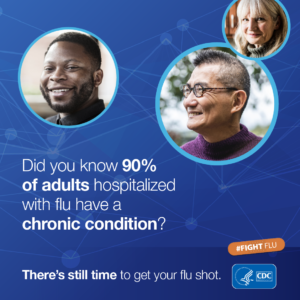National Influenza Vaccination Week
 |
National Influenza Vaccination Week (NIVW) is an annual observance from December 6-12 to remind everyone that those who are 6 months and older still have time to get vaccinated against flu. Getting vaccinated is particularly important for people who are most vulnerable to developing serious flu complications, including people with certain chronic conditions such as asthma, diabetes and heart disease. In fact, last flu season 9 out of 10 adults hospitalized for flu had at least one reported underlying medical condition.
Since COVID-19 and flu could spread simultaneously this winter, it’s especially important this year to get a flu shot to reduce your risk of a possible co-infection with both viruses. This could also place a tremendous burden on the health care system and result in many more illnesses, hospitalizations and deaths than during a regular flu season — especially among people managing chronic conditions because many of them also are at higher risk from COVID-19. The good news is that there is a flu vaccine that is tried and true; proven to reduce the risk of flu illness, hospitalizations and death.
There’s so much that’s beyond control this winter season. But we do have the power to get a flu shot to protect ourselves and our families from flu and its complications. Flu vaccination during the COVID-19 pandemic should be of added importance because it can help reduce the overall burden of respiratory disease and save medical resources for the care of COVID-19 patients.
Together, we can use NIVW as a nationwide call to action to encourage everyone ages 6 months and older to get their annual flu shot, especially those with chronic conditions. The more people vaccinated against flu, the more people protected from flu.
We hope you will join us this year as we encourage everyone — especially those most vulnerable — to protect themselves and their loved ones from flu this season. More information is available on our seasonal flu webpage.
Resources:
CDC
